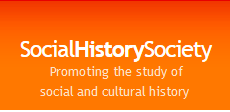 We are seeking contributors to a Roundtable on public history and heritage at this year’s Social History Society conference (March 31st – April 2nd, University of Portsmouth – more information here: https://www.socialhistory.org.uk/conference).
We are seeking contributors to a Roundtable on public history and heritage at this year’s Social History Society conference (March 31st – April 2nd, University of Portsmouth – more information here: https://www.socialhistory.org.uk/conference).
Chairs: Dr Alix Green (Lecturer in Public History, University of Central Lancashire) and Dr Jessica Moody (Lecturer in Modern History and Heritage, University of Portsmouth and Port Towns & Urban Cultures Project Member)
Our abstract is set out below. If this is something you would like to contribute to, please email us Jessica.moody@port.ac.uk and AGreen15@uclan.ac.uk with a brief biography and an initial 100 word response to the issues/themes set out, or anything which relates to your own research and practice.
We require responses by Friday 13th February. Participants welcome from any discipline, which ‘engages with the past’. Please email us with any questions or queries, or post a question on this blog.
Between public history and heritage: making, sharing and debating the past in a global present
‘Public history’ and ‘heritage’ are widely used interchangeably and without careful attention to the complex, contested and elusive – if not hidden – conceptual and practical difficulties they present. These terms matter. They affect how professionals in historical fields see themselves, their work, educational programmes – and each other; they therefore merit our serious attention. They also carry differing public understandings, images, symbolism – and power.
Public history is a field with an increasingly global reach. The International Federation for Public History held its first conference in 2014, and the International Congress of the Historical Sciences will host its first public history roundtable in Jinan next year. ‘Heritage’ has in some senses always been both paradoxically more ‘local’ and more ‘global’ in outlook. The provision of international codes of conduct as set out by UNESCO and transnational policy guidance at times sitting awkwardly against the various contested understandings of the term, its practice, policies and limitations, which are mediated by far more regional, national, and local cultural codes, and, indeed, by history itself. Further, the academic field of Heritage Studies has developed immensely in the last few decades. It has developed globally, taking on a distinctly ‘critical’ tone in some spheres – the global Association of Critical Heritage Studies, which is now in its second year, holds an international conference every two years, this year in Canberra. Yet a global community of enquiry has yet to emerge to take on the debates about academic and professional identity, to engage with the blurring or elision of the conceptual space between public history and heritage, both academically and professionally.
Partly, this conceptual space is forged within and beside academic disciplines and their own boundaries. Whereas Public History can more easily be assigned lineage to History as a discipline – with roots in the historical method, albeit both inside and outside ‘the academy’, Heritage is academically far more eclectic. However, in ‘western’ contexts, Heritage’s relationship with archaeology, has traditionally tied its study to materiality, especially in the UK. This is itself a relationship forged within the crucible of the western ‘discourse’ of heritage, which Laurajane Smith (2006) has argued foregrounds ‘heritage’ as largely tangible, old, elite, white and male.
Generally, historians – whether they label themselves as ‘public’ or otherwise – are not looking to the history of these concepts in a way, which may help us explore their meaning in the present. Does the coining of ‘public history’ in the US, and its subsequent import by the UK and elsewhere obscure a longer lineage of ‘history in public’ in those countries? If historians have acquired ‘public history’ as a label for their work outside the academy, what claim to, or involvement in, ‘heritage’ should they have? To what extent are we acknowledging and exploring the historical, political and social ‘baggage’ that accompany these terms? These are issues, which the contributors to this panel, many of whom mediate the conceptual space between public history and heritage in their professional lives, will scrutinize.
Find out more about the Engaging with the Past Reading Group










Comments are closed.